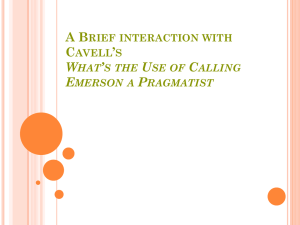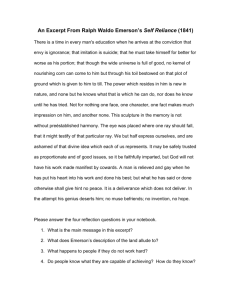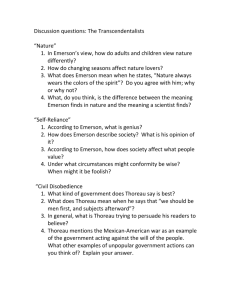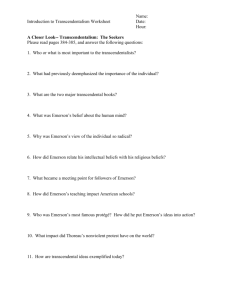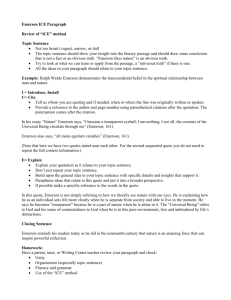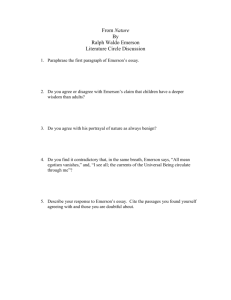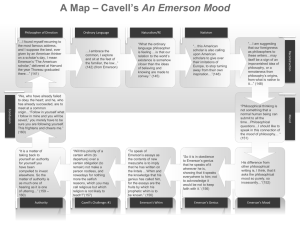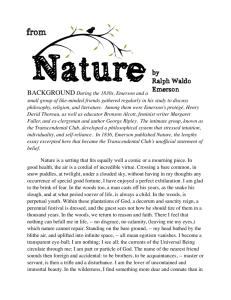"Does Emerson's Pluralism Go All the Way Down?"
advertisement
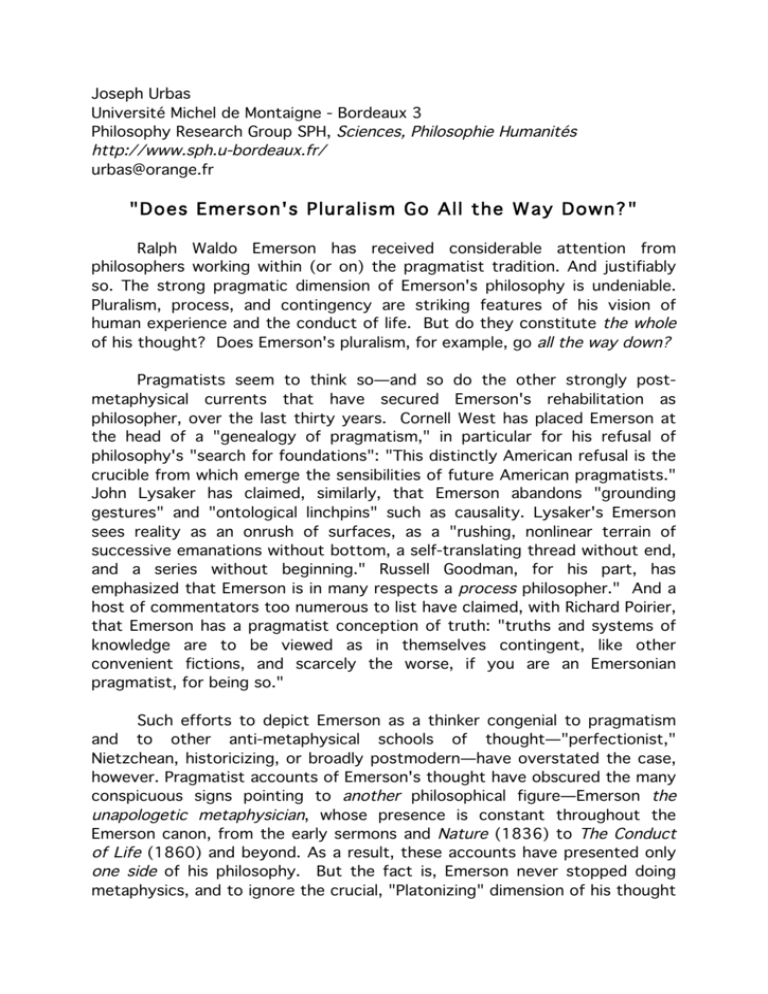
Joseph Urbas Université Michel de Montaigne - Bordeaux 3 Philosophy Research Group SPH, Sciences, Philosophie Humanités http://www.sph.u-bordeaux.fr/ urbas@orange.fr "Does Emerson's Pluralism Go All the Way Down?" Ralph Waldo Emerson has received considerable attention from philosophers working within (or on) the pragmatist tradition. And justifiably so. The strong pragmatic dimension of Emerson's philosophy is undeniable. Pluralism, process, and contingency are striking features of his vision of human experience and the conduct of life. But do they constitute the whole of his thought? Does Emerson's pluralism, for example, go all the way down? Pragmatists seem to think so—and so do the other strongly postmetaphysical currents that have secured Emerson's rehabilitation as philosopher, over the last thirty years. Cornell West has placed Emerson at the head of a "genealogy of pragmatism," in particular for his refusal of philosophy's "search for foundations": "This distinctly American refusal is the crucible from which emerge the sensibilities of future American pragmatists." John Lysaker has claimed, similarly, that Emerson abandons "grounding gestures" and "ontological linchpins" such as causality. Lysaker's Emerson sees reality as an onrush of surfaces, as a "rushing, nonlinear terrain of successive emanations without bottom, a self-translating thread without end, and a series without beginning." Russell Goodman, for his part, has emphasized that Emerson is in many respects a process philosopher." And a host of commentators too numerous to list have claimed, with Richard Poirier, that Emerson has a pragmatist conception of truth: "truths and systems of knowledge are to be viewed as in themselves contingent, like other convenient fictions, and scarcely the worse, if you are an Emersonian pragmatist, for being so." Such efforts to depict Emerson as a thinker congenial to pragmatism and to other anti-metaphysical schools of thought—"perfectionist," Nietzchean, historicizing, or broadly postmodern—have overstated the case, however. Pragmatist accounts of Emerson's thought have obscured the many conspicuous signs pointing to another philosophical figure—Emerson the unapologetic metaphysician, whose presence is constant throughout the Emerson canon, from the early sermons and Nature (1836) to The Conduct of Life (1860) and beyond. As a result, these accounts have presented only one side of his philosophy. But the fact is, Emerson never stopped doing metaphysics, and to ignore the crucial, "Platonizing" dimension of his thought 2 is to take the part for the whole. If in Nature Emerson conducted a selfconscious metaphysical inquiry "respecting the laws of the world and the frame of things," his stance in Representative Men (1850) is really no different. Here is his metaphysician's definition of philosophy in "Plato, or the Philosopher": Philosophy is the account which the human mind gives to itself of the constitution of the world. Two cardinal facts lie forever at the base; the One and the two. 1. Unity or Identity; and, 2. Variety. The Plato essay goes on to identify "the twin dangers of speculation," i.e. "a too rapid unification, and an excessive appliance to parts and particulars." The second danger—which an exclusive emphasis on Emerson's pragmatic side conveniently ignores—is what Emerson had already perceived in Nature as the danger inherent in "empirical science," which is "apt to cloud the sight, and by the very knowledge of functions and processes, to bereave the student of the manly contemplation of the whole." Emerson does not want a "minuteness in details" divorced from metaphysics, any more than Plato wanted the "bare lists and inventories" of Ionian science without a true "theory of the world" to back them up. Emerson wants not only the particular sciences—the essay Nature mentions conchology and botany—but also a "metaphysics of conchology and botany." Emerson's admiration for Plato is grounded in what one-sided rehabilitation readings have excluded—synthesis. Emerson admires Plato's "wonderful synthesis": "a balanced soul was born, perceptive of the two elements"; "a man who could see two sides of a thing was born." With Plato the "two poles appear," the ordinary and the metaphysical, just as they did in "The American Scholar," which sought "the ultimate reason" of everyday "matters," the "eternal law" in "every trifle," "the sublime presence of the highest spiritual cause lurking . . . in these suburbs and extremities of nature." The Plato essay should give us pause. The time has come to stop systematically "de-Transcendentalizing" Emerson, to stop presenting only one side of his thought—the side that our post-metaphysical age happens to like best. Emerson himself insisted on both: on the many—as pragmatists and other rehabilitators have rightly insisted—but also on the One. In the essay "Fate," published ten years after the portrait of Plato, Emerson will ask the crucial question, i.e. whether, faced with the radical diversity of experience, "we are permitted to believe in unity?" ("Fate"). The answer Emerson gives is of course yes. "Fate" closes on a hymn to "the Blessed Unity," to "the Beautiful Necessity," to the supreme metaphysical principle, to the Law that "rules throughout existence," i.e. causality (the "eternal Cause" to which Emerson had already given his final word in "Montaigne, or the Skeptic"). 3 There is, in other words, an ultimate metaphysical ground in Emerson's thought, a causa causarum, a principle of unity and permanence behind his pluralist ontology of laws and causes. Causality is Emerson's universal ground and universal truth-maker. Truth is "out there" because it is simply, for Emerson, another word for a metaphysical grounding in the causal relation. Hence the crucial line of Emerson's reply to the "representative skeptic," Montaigne: "Truth or the connection of cause and effect alone interests us." Emerson never stopped doing metaphysics, never gave up on truth with a capital "T" or cause with a capital "C". As Lawrence Buell has correctly observed, "neither Nietzche nor [William] James" shared Emerson's belief in the priority of Truth with a capital T." Emerson's pluralism does not go all the way down. In his philosophy, process does have a terminus a quo, a "beautiful necessity" does rule throughout existence, and truth is "out there" as well as in our propositions. Many would find this account of Emerson's philosophy difficult to accept. John Lysaker, for example, cites the following passage of "The Method of Nature" to justify his refusal of causation as an ultimate metaphysical ground in Emerson's thought: Away profane philosopher! Seekest thou in nature the cause? This refers to that, and that to the next, and the next to a third, and everything refers. Thou must ask in another mood, thou must feel it and love it, thou must behold it in a spirit as grand as that by which it exists, ere thou canst know the law. Known it will not be, but gladly beloved and enjoyed. Lysaker interprets Emerson's language here as "draw[ing] the bottom out from under this would-be ontological linchpin," i.e., causality. But Lysaker mistakes for an infinite regress in "The Method of Nature" what Emerson called, in an 1834 echo of Sir Francis Bacon, "the round of second causes": [I]t may be said of the things apprehended by the senses, that they are so nicely grooved into one another that the sight of one suggests the next preceding, and this the next before, so that the understanding in the study of the things themselves would run forever in the round of second causes, did not the soul at its own instance sometimes demand tidings of the First Cause. Emerson liked these lines so much that he re-used them over 25 years later in an 1860 lecture on the "Moral Sense." In that same lecture he defined the moral sense as "the desire of union with the Cause of all." What Emerson is describing, both in the 1834 sermon and the late lecture, is an unexpected reversal in our perception of causality—a reversal that is arguably the defining moment of his metaphysics. What we took to be an endless chain of 4 causes in nature is, in reality, when seen as whole, an effect: "Not the cause, but an ever novel effect, nature descends always from above." In a word, nature too "has a cause like all the rest." It finds its origin and ground in a "metaphysical and eternal spring." If the cause-effect reversal marks the dawn of metaphysics in Emerson's philosophy, it is also the moment of revelation or religious insight, which Emerson consistently equates with a perception of the absolute causal ground of being. This higher perception, which is a form of obedience to the Cause (capital C), comes, as we have just seen, at the soul's own "instance" or urging. Emerson recorded the following experience of intuition: The year after he had published the essay Nature, A certain wandering light comes to me which I instantly perceive to be the Cause of Causes. It transcends all proving. It is itself the ground of being; and I see that it is not one & I another, but this is the life of my life. This form of higher intuition is what Emerson calls—to quote "The Method of Nature" again—"look[ing] at nature, with a supernatural eye": "By piety alone, by conversing with the cause of nature, is [man] safe and commands it." The profane philosopher in "The Method of Nature" is the natural philosopher—that is to say, the scientist. He is "profane" because he considers nature exclusively as a chain of "second causes scattered," to borrow Bacon's language. The scientist does not see that what we are adopting, when we contemplate the wonders of nature as a whole, is less a scientific than a properly metaphysical or religious stance—a stance that recalls St. Augustine's Alii disputent, ego mirabor, a line which Emerson was fond of quoting. In Emerson's philosophy, then, the chain of causality does indeed have a terminus a quo, an ultimate metaphysical ground in the Cause, with a capital C. The claim that causality in Emerson is condemned to infinite regress collapses under the prodigious weight of evidence to the contrary. Of explicit references to a causa causarum throughout the Emerson canon, I have found over 70 examples—and that figure does not include personified, capitalized references to a supreme causality—God, the Deity, the Maker, the Creator, the Supreme Being, the Supreme Ordainer, the Lawgiver, etc. Nor does the figure include capitalized metaphysical terms that may be rightfully assimilated to the causa causarum, such as Spirit, Soul, Mind, Thought, Intelligence, Reason, Being, Reality, and Law. If Emerson's thought does indeed have an ultimate metaphysical ground in a causa causarum, this ground excludes neither pluralism, nor process, nor progress. All of these are easily accommodated within a metaphysical monism that sees the world as a causal, ontological, and moral continuum where "relation and connection are not somewhere and sometimes, but everywhere and always" ("Worship," CW 6:117), where "all 5 things are moral" and the "axioms of physics translate the laws of ethics" (Nature, CW 1: 25, 21). Emerson's causationist metaphysics is not an instance of "looking backward," as William James might put it. Emerson's "flowing law" of causation is, rather, what is moving reality relentlessly forward. Causation is the spiritual, metaphysical, and moral principle that "drives the drivers." Universal causation is the "universal reliance" on which self-reliance, progress, and "onwardness" are based. If the causa causarum is not backward-looking, nor is it to be equated with stasis. Emerson's supreme cause is less synonymous with fixity than with movement. The Cause is also a Causeway, as one of Emerson's Transcendentalist friends put it. Or to change the metaphor of movement: the Cause, as in a watch, what secures the spring. In philosophies and in men, as in watches, Emerson required some sort of linchpin: Thus all philosophy begins from Nox & Chaos, the Ground or Abyss which Schelling so celebrates. And in every man we require a bit of night, of chaos, and Abgrund, as the spring of a watch turns best on a diamond. In every individual we require a pièce de résistance, a certain abyss of reliance and fortitude on which to fall back on, when worst comes to worst. That continent, that backbone being secure, he may have what variety, what surface, what ornament, what flourish he will. Thus if Emerson refuses the idea of metaphysical groundlessness, that refusal entails no commitment to fixity. Nor does it mean any devaluation of pluralism or contingency. Emerson's vision of reality as one great causal continuum honors both the universal and the particular, both the One and the many, as equally divine (even if the first has ontological priority): "the necessity by which Deity rushes into distribution, into variety & particles, is not less divine than the unity from which all begins." I would like to emphasize this last phrase: the unity from which all begins. If process is characteristic of Emerson's metaphysics, as Russell Goodman has insisted, so is the Identity from which it initially emerges. The same double commitment to Identity and flow may be found in the following passage from Emerson's journal, where he provides a valuable summary of the core principles of his own thought: My philosophy holds to a few laws. 1. Identity, whence comes the fact that metaphysical faculties & facts are the transcendency of physical. 2. Flowing, or transition, or shooting the gulf, the perpetual striving to ascend to a higher platform, the same thing in new & higher forms. Significantly, Emerson begins with Identity, with the "unity from which all begins." This is the ground of his metaphysics. "Flow," which recent scholarship has privileged above all else, remains a partial and undertheorized 6 figure without the first term. The two laws that Emerson lists, Identity and flow, are both characteristics of causation. To return to the question with which I began : Emerson's pluralism does not go all the way down. The pragmatist dimension of his thought ultimately rests, whether we like it or not, on a metaphysical monism. "The Beautiful Necessity, which secures that all is made of one piece"—I'm quoting "Fate"— is universal causation, the law "that rules throughout existence" ("Fate," CW 6:26). The case of Emerson raises the broader question of pragmatism's relation to metaphysics—which may turn out to be one of the major themes of this conference. It is not as if the two terms, pragmatism and metaphysics, had to be incompatible, as the example of Peirce's philosophy shows. There is an interesting parallel between Peirce's "psycho-physical monism" (Burch) and Emerson's doctrine of the Sovereignty of Mind. In any case, Emerson the pragmatist should not crowd out Emerson the metaphysician. 7 Quotations and References 1. "This distinctly American refusal [of modern philosophy's search for foundations] is the crucible from which emerge the sensibilities of future American pragmatists" (Cornell West, The American Evasion of Philosophy: A Genealogy of Pragmatism [London: Macmillan, 1989], p. 36). 2. "Grounding gestures," "ontological linchpin[s]"; "a rushing, nonlinear terrain of successive emanations without bottom, a self-translating thread without end, and a series without beginning" (John T. Lysaker, Emerson and Self-Culture [Bloomington: Indiana UP, 2008], pp. 87, 86. 3. Emerson is "in many respects a process philosopher," Russell B. Goodman ("Paths of Coherence through Emerson's Philosophy: The Case of 'Nominalist and Realist,'" in The Other Emerson, ed. Branka Arsic and Cary Wolfe [Minneapolis: U of Minnesota P, 2010], p. 46). 4. "Truths and systems of knowledge are to be viewed as in themselves contingent, like other convenient fictions, and scarcely the worse, if you are an Emersonian pragmatist, for being so" (Richard Poirier, Poetry and Pragmatism [London: Faber and Faber, 1992], p. 22). 5. "In inquiries respecting the laws of the world and the frame of things, the highest reason is always the truest" (Emerson, Nature, Collected Works [hereafter CW], Harvard UP, 1:39). 6. "Philosophy is the account which the human mind gives to itself of the constitution of the world. Two cardinal facts lie forever at the base; the One and the two. 1. Unity or Identity; and, 2. Variety," (Emerson, "Plato, or the Philosopher," Representative Men, CW 4:27). 7. "A too rapid unification, and an excessive appliance to parts and particulars, are the twin dangers of speculation" ("Plato," CW 4:30). 8. "Empirical science is apt to cloud the sight, and, by the very knowledge of functions and processes, to bereave the student of the manly contemplation of the whole"; "I cannot greatly admire minuteness in details, so long as there is no hint to explain the relation between things and thoughts; no ray upon the metaphysics of conchology, of botany, of the arts, to show the relation of the forms of the flowers, shells, animals, architecture, to the mind, and build science upon ideas" (Nature, CW 1:39, 40; Emerson's italics). 9. "The physical philosophers had sketched each his theory of the world,—the theory of atoms; of fire; of flux; of spirit; theories mechanical and chemical in their genius. Plato, a master of mathematics, studious of all natural laws and causes, feels these, as second causes, to be no theories of the world, but bare inventories and lists" ("Plato," CW 4:32). 10. The wonderful synthesis so familiar in nature, the upper and the under side of the medal of Jove, the union of impossibilities which reappears in every object, its real and its ideal power, was now also transferred entire to the consciousness of man"; "a balanced 8 soul was born, perceptive of the two elements"; "a man who could see two sides of a thing was born"; "the two poles appear" ("Plato," CW 4:31). 11. What would we really know the meaning of? The meal in the firkin; the milk in the pan; the ballad in the street; the news of the boat; the glance of the eye; the form and the gait of the body;—show me the ultimate reason of these matters;—show me the sublime presence of the highest spiritual cause lurking, as always it does lurk, in these suburbs and extremities of nature; let me see every trifle bristling with the polarity that ranges it instantly on an eternal law; and the shop, the plough, and the leger, referred to the like cause by which light undulates and poets sing;—and the world lies no longer a dull miscellany and lumber room, but has form and order; there is no trifle; there is no puzzle; but one design unites and animates the farthest pinnacle and the lowest trench. ("The American Scholar," CW 1:67-68) 12. A "de-Transcendentalized" Emerson (Lawrence Buell, "The Emerson Industry in the 1980's," ESQ: A Journal of the American Renaissance 30 [1984], p. 127). 13. "Now, whether seeing these two things, fate and power, we are permitted to believe in unity?"; "Let us build altars to the Blessed Unity"; "Let us build altars to the Beautiful Necessity, which secures that all is made of one piece"; "that Law rules throughout existence" ("Fate," CW 6: 14?, 26); "all are at last contained in the eternal Cause" ("Montaigne," CW 4:105). 14. "Truth or the connection ("Montaigne," CW 4:96). of cause and effect alone interests us " 15. "Neither Nietzche nor James shared Emerson's belief in the priority of Truth with a capital T " (Lawrence Buell, Emerson, Harvard UP, 2003, p. 238). 16. "Away profane philosopher! Seekest thou in nature the cause? This refers to that, and that to the next, and the next to a third, and everything refers. Thou must ask in another mood, thou must feel it and love it, thou must behold it in a spirit as grand as that by which it exists, ere thou canst know the law. Known it will not be, but gladly beloved and enjoyed" (Emerson, "The Method of Nature," CW 1:125). 17. Emerson is "draw[ing] the bottom out from under this would-be ontological linchpin," i.e., causality (Lysaker, Emerson and Self-Culture, p. 86). 18. "[I]t may be said of the things apprehended by the senses, that they are so nicely grooved into one another that the sight of one suggests the next preceding, and this the next before, so that the understanding in the study of the things themselves would run forever in the round of second causes, did not the soul at its own instance sometimes demand tidings of the First Cause" (Emerson, Sermon 169, Collected Sermons, University of Missouri P, 4:230). Bacon: "It is true, that a little philosophy inclineth man's mind to atheism; but depth in philosophy bringeth men's minds about to religion. For while the mind of man looketh upon second causes scattered, it may sometimes rest in them, and go no further; but when it beholdeth the chain of them, confederate and linked together, it must needs fly to Providence and Deity" ("Of Atheism"). 9 19. The "moral sense" is "the desire of union with the Cause of all" (Later Lectures, University of Georgia P, 2:143, 149). 20. "Not the cause, but an ever novel effect, nature descends always from above" ("The Method of Nature," CW 1:124-125); "nature "has a cause like all the rest" ("Circles," CW 2:180) and finds its ground in "a metaphysical and eternal spring" ("The Method of Nature," CW 1:124-125). 21. "A certain wandering light comes to me which I instantly perceive to be the Cause of Causes. It transcends all proving. It is itself the ground of being; and I see that it is not one & I another, but this is the life of my life" (Emerson, Journal C, Journals and Miscellaneous Notebooks, Harvard UP, [Hereafter JMN], 5:337). 22. This form of higher intuition is what Emerson calls "look[ing] at nature, with a supernatural eye": "By piety alone, by conversing with the cause of nature, is [man] safe and commands it" (CW 1:131). St. Augustine: Alii disputent, ego mirabor ("Wrangle who pleases, I will wonder"). 23. "Relation and connection are not somewhere and sometimes, but everywhere and always" (Emerson, "Worship," CW 6:117). "All things are moral"; "the axioms of physics translate the laws of ethics" (Nature, CW 1: 25, 21). 24. "The spirit will return. It drives the drivers" (Emerson, "Worship," CW 6:106). 25. "God, who is my Cause, is my Causeway" (C.A. Bartol, Radical Problems, Boston: Roberts, 1872, p. 406). 26. "Thus all philosophy begins from Nox & Chaos, the Ground or Abyss which Schelling so celebrates. And in every man we require a bit of night, of chaos, and Abgrund , as the spring of a watch turns best on a diamond. In every individual we require a pièce de résistance, a certain abyss of reliance and fortitude on which to fall back on, when worst comes to worst. That continent, that backbone being secure, he may have what variety, what surface, what ornament, what flourish he will" (Emerson, Journal W, JMN 9:223). 27. "The necessity by which Deity rushes into distribution, into variety & particles, is not less divine than the unity from which all begins" (Emerson, "Platoniana, "JMN 10:480; 476). 28. "My philosophy holds to a few laws. 1. Identity , whence comes the fact that metaphysical faculties & facts are the transcendency of physical . 2. Flowing, or transition, or shooting the gulf, the perpetual striving to ascend to a higher platform, the same thing in new & higher forms" (Emerson, Journal VO, 1857; JMN 14:191). "The Beautiful Necessity, which secures that all is made of one piece," is universal causation, the law "that rules throughout existence" (Fate, CW 6:26).

